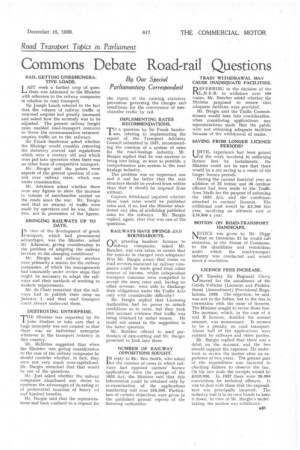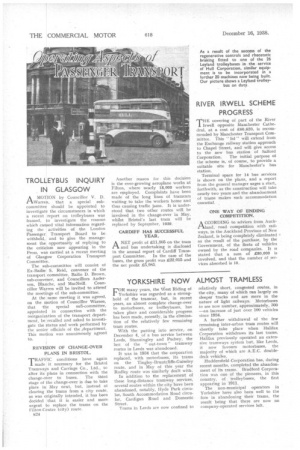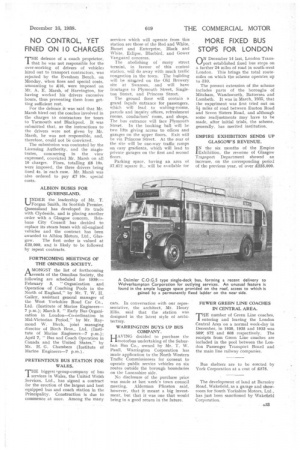Commons Debate Road-rail Questions
Page 57

Page 58

Page 59

If you've noticed an error in this article please click here to report it so we can fix it.
By Our Special Parliamentary Correspondent
RAIL GETTING UNREMUNERA. TIVE LOADS.
I AST week a further crop of ques1.4 tions was addressed to the Minister with reference to the railway companies in relation to road transport.
Sir Joseph Leach referred to the fact that the volume of railway traffic in returned empties had greatly increased and asked how the anomaly was to be adjusted. The present railway freight rates enabled road-transport concerns to throw the unremunerative returnedempties traffic on to the railways.
Sir Frank Sanderson asked whether the Minister would consider removing the statutory control and regulations which were a century old and which were put into operation when there was no other form of competitive transport.
Mr. Burgin said the points were aspects of the general question of control over railway rates, which was under consideration.
Mr. Adamson asked whether there were any figures to show the increase in volume of merchandise carried on the roads since the war. Mr. Burgin said that no returns of traffic were made by operators and he was, therefore, not in possession of the figures.
BRINGING RAILWAYS UP TO DATE.
I N view of the development of goods transport, which had pronounced advantages, was the Minister, asked Mr. Adamson, giving consideration to the problem of adapting the railway services to the changing conditions?
Mr. Burgin said railway services were primarily a matter for the railway companies, of which the managements had constantly under review steps that might be necessary to adapt the railways and their methods of working to modern requirements.
Mr. de Chair remarked that the railways had to publish their rates on January 1, and that road transport could always under-cut them.
DESTROYING ENTERPRISE.
THE Minister was requested by Sir John Haslam to take care that a huge monopoly was not created so that there was no individual enterprise whatever in the transport industry in this country.
Mr. McEntee suggested that when the Minister was giving consideration to the case of the railway companies he should consider whether, in fact, they were not very much over-capitalized. Mr. Burgin remarked that that would be one of the questions.
Mr. Joel asked whether the railway companies abandoned any desire to continue the advantages of de-rating or of preferential taxation of heavy oil and kindred benefits.
Mr. Burgin said that the representations had been confined to a request for the repeal of the existing statutory provisions governing the charges and conditions -for the conveyance of merchandise traffic by rail.
IMPLEMENTING RATES RECOMMENDATIONS.
Ra question by Sir Frank Sanderon, relating to implementing the report of the Transport Advisory Council submitted in 1937, recommending the creation of a system of rates for the road-haulage industry, Mr. Burgin replied that he was anxious to bring into being, so soon as possible, a comprehensive rate system in the road haulage industry.
The problem was an important one and it was far better that the rate structure should be evolved from within than that it should be imposed from without.
Captain Strickland inquired whether these road rates would be published rates and, if so, had the Minister abandoned any idea of abolishing published rates for the railways. Mr. Burgin replied, again, that that was one of the questions.
RAILWAYS HAVE SWINGS-AND ROUNDABOUTS.
ONgranting hauliers' licences to railway companies, asked Mr. Butcher, was care taken to ensure that the rates-to be charged were adequate? Was Mr. Burgin aware that losses on road services sustained by railway companies could be made good from other sources of income, whilst independent transport concerns were compelled to accept the same rates and, having no other revenue, wereable to discharge their obligations under the Traffic Acts only with considerable difficulty?
Mr. Burgin replied that Licensing Authorities had no power to attach conditions as to rates, but they took into account evidence that traffic was being obtained by unfair means. He could not assent to the suggestion in the latter question.
Mr. Butcher offered to send particulars of rate-cutting and Mr. Burgin promised to look into them.
NUMBER OF RAILWAY OPPOSITIONS SOUGHT.
I N reply to Mr. Ben Smith, who asked for the number of cases in which railways bad opposed carriers' licence applications since the passage of the 1933 Act, the Minister said that this information could be obtained only by re-examination of the applications numbering well over 250,000. Particulars of certain objections were given in the published annual reports of the licensing authorities TRAIN WITHDRAWAL MAY CAUSE INADEQUATE FACILITIES.
RDEFERRING to the decision of the L.N.E.R. to withdraw over 100 trains, Mr. Butcher asked whether the Minister proposed to ensure that adequate facilities were provided.
Mr. Burgin said the Traffic Commissioners would take into consideration, when considering applications, any representations made that the public were not obtaining adequate facilities because of the withdrawal of trains.
SAVING FROM LONGER LICENCE PERIODS?
UNTIL experience had been gained of the work involved in collecting licence fees by instalments, the Minister could not be sure that there would be a net saving as a result of the longer licence periods.
During the current financial year an addition of 32 indoor and 30 outdoor officers had been made to the Traffic Area Staffs for the purpose of enforcing the 1933 Act, and the conditions attached to carriers' licences, The additional cost would be £5,500 this year, involving an ultimate cost of £16,000 a year.
MOTION ON ROAD-TRANSPORT HANDICAPS.
NOTICE was given by Mr. Higgs that on December 21 he would call attention, in the House of Commons, to the disabilities and restrictions under which the road-transport industry was conducted and would move a resolution.
LICENCE FEES INCREASE.
ON Tuesday Sir Reginald Clarry moved for the annulment of the Goods Vehicles (Licences and Prohibitions) (Amendment) Provisional Regulations, 1938. The objection, he said, was not to the duties, but to the fees in connection with the issue of licences, The Minister sought to revise those fees. The increase, which, in the case of A and B licences, doubled the annual amount, was unnecessary. It seemed to be a penalty on road transport. About half of the applications were resisted by railways and other parties.
Mr. Burgin replied that there was a debit on the account, and the fees should support the expenses. He undertook to review the matter after an experience of two years. The greater part of the expenditure was incurred in checking failures to observe the law. On his new scale the receipts would be £319,000. In 1937 there were 26,000 convictions for technical offences. It was to deal with these that the expenditure was principally incurred. The industry had it in its own hands to keep it down. In view of Mr. Burgin's undertaking, the motion was withdrawn.
TROLLEYBUS INQUIRY IN GLASGOW
AMOTION by Councillor V. D. Warren, that a special subcommittee should be appointed to investigate the circumstances in which a recent report on trolley buses was framed, to investigate the reasons which caused vital information regarding the activities of the London Passenger Transport Board to be withheld, and to give the management the opportunity of replying to the criticism now appearing in the Press, was carried at a recent meeting of Glasgow Corporation Transport Committee.
The sub-committee will consist of Ex-Bailie S. Reid, convener of the transport committee, Bailie D. Brown, sub-convener, and Councillors Ander
son, Blanche, and MacNeil. Councillor Warren will be invited to attend the meetings of the sub-committee.
At the same meeting it was agreed, on the motion of Councillor Warren, that the special sub-committee, appointed in connection with the reorganization of the transport department, be recalled and asked to investigate the status and work performed by the senior officials of the _department. This motion was unanimously agreed to.
REVISION OF CHANGE-OVER PLANS IN BRISTOL.
'TRAFFIC conditions have again I made it necessary for the Bristol Tramways and Carriage Co., Ltd., to alter its plans in connection with the change-over to buses. The third stage of the change-over is due to take place in May next, but, instead of clearing the trams from a city route, as was originally intended, it has been decided that it is easier and more urgent to replace the trams on the Eilton-Centre (city) route.
Ts24 Another reason for this decision is the ever-growing aeroplane works at Filton, where nearly 18,000 workers are employed. Complaints have been made of the long lines of tramcars waiting to take the workers home and thus causing traffic jams. It is understood that two other routes will be involved in the change-over in May, whilst Bristol's last tram will be replaced by September, 1939.
CARDIFF HAS SUCCESSFUL YEAR.
ANET profit of 211,805 on the tram and bus undertaking is disclosed in the annual report of Cardiff Transport Committee. In the case of the buses, the gross profit was 222,015 and the net profit £5,9S5.
RIVER IRWELL SCHEME PROGRESS
THE covering of part of the River frwell opposite Manchester Cathedral, at a cost of 260,620, is recommended by Manchester Transport Committee. This" lid" will extend from the Exchange railway station approach to Chapel Street, and will give access to the new bus station of Salford
Corporation. The initial purpose of the scheme is, of course, to provide a suitable site for Manchester's bus station.
Terminal space for 14 bus services is shown on the plans, and a report from the general manager urges a start, forthwith, as the construction will take nearly two years and the abandonment of trams makes such accommodation essential.
ONE WAY OF ENDING COMPETITION.
ACCORDING to advices from Auckland, road competition with railways, in the Auckland Province of New Zealand, is being completely eliminated as the 'result of the purchase, by the Government, of the fleets of vehicles owned by the road companies. It is stated that a sum of 230,000 is involved, and that the number of ,services absorbed is 10.
NO CONTROL, YET FINED ON 10 CHARGES
THE defence of a coach proprietor, that he was not responsible for the over-working of drivers of vehicles hired out to transport contractors, was rejected by the Evesham Bench, on Monday, when fines and special costs, amounting to £16, were imposed 011
• Mr. A. E. Marsh, of Harvington, for having worked his drivers excessive hours, thus preventing them from getting sufficient rest.
For the defence it was said that Mr. Marsh hired out the coaches involved in the charges ba contractors for tours to Yarmouth and Blackpool. It was submitted that, as the instructions to the drivers were not given by Mr. Marsh, he was not responsible, and, therefore, could not be convicted.
The submission was contested by the Licensing Authority, and the magistrates, concurring in the view expressed, convicted Mr. Marsh on all 10 charges. Fines, totalling £8 10s. were imposed, the three drivers being fined 4s. in each case. Mr. Marsh was also ordered to pay £7 10s. special Costs.
ALBION BUSES FOR QUEENSLAND.
UNDER the leadership of Mr. T. Forgan Smith, its Scottish Premier, Queensland has developed its trade with Clydeside, and is placing another order with a Glasgow concern. Brisbane City Council has decided to replace its steam buses with oil-engined vehicles and the contract has been awarded to Albion Motors, Ltd., Glas
gow. The first order is valued at £20,000, and is likely to be followed by repeat contracts.
FORTHCOMING MEETINGS OF THE OMNIBUS SOCIETY.
AMONGST the list of forthcoming events of the Omnibus Society, the following are scheduled for 1939:— February 3, "Organization and Operation of Coaching Pools in the North of England," by Mr. T. W. II. Galley, assistant general manager of the West Yorkshire Road Car Co., Ltd. (Institute of Marine Engineers7 p.m.); March 3, "Early Bus Organization in London—Co-ordination in Mid-Victorian Period," by Mr. Raymond W. Birch, joint managing director of Birch Bros., Ltd. (Institute of Marine Engineers-7 p.m.): April 7, "Bus and Coach Operation in Canada and the United States," by Mr. H. G. Chambers (Institute of Marine Engineers-7 p.m.).
PRETENTIOUS BUS STATION FOR WALES.
THE biggest 'group-company of bus services in Wales, the United Welsh Services, Ltd., has signed a contract for the erection of the largest and best equipped bus and coach station in the Principality. Construction is due to commence at once. Among the many
services which will operate from this station are those of the Red and White, Basset and Enterprise, Black and White, Eclipse, Bluebird, and Gower Vanguard concerns.
The abolishing of many street termini, in favour of this central station, will do away with much traffic congestion in the town. The building will be sitiotecl on the Old Brewery site at Swansea, and will have frontages to Plymouth Street, Singleton Street, and Princess Street.
The ground floor will contain a grand façade entrance for passengers, which will lead to waiting-rooms, parcels and inquiry offices, refreshment rooms, conductors' room, and shops. The bus entrance will face Plymouth Street. In the booking hall will he two lifts giving access to offices and garages on the upper floors. Exit will be via Princess Street. At the rear of the site will be one-way traffic ramps on easy gradients, which will lead to private garages on the first and second floors.
Parking space, having an area of 37,812 square ft., will be available for cars. In conversation with our representative, the architect, Mr. Henry Ellis, said that the station was designed in the latest style of architecturp.
WARRINGTON BUYS UP BUS COMPANY.
HAVING decided to purchase the motorbus undertaking of the Suburban Bus Co., owned by Mr. T, W. Paull, Warrington Corporation has made application to the North Western Traffic Commissioners for consent to operate public service vehicles on six routes outside the borough boundaries on the Lancashire side.
No disclosure of the purchase price was made at last week's town council meeting. Alderman Plinston said, however, that it meant a big investment, but that it was one that would bring in a good return in the future.
MORE FIXED BUS STOPS FOR LONDON
ON December 14 last, London Transport established fixed bus stops on a further 24 miles of road in south-west London. This brings the total routemiles on which the scheme operates. up to 310.
The present extension of the scheme includes parts of the boroughs of Mitcham, Wandsworth, Battersea and Lambeth. It was in March, 1035, that the experiment was first tried out on 51 miles of road between Euston Road and Seven Sisters Road, and although some readjustments may have to be made, after initial trials, the scheme. generally, has merited institution.
EMPIRE EXHIBITION SENDS UP GLASGOW'S REVENUE.
TN the six months of the Empire !Exhibition, the revenue of Glasgow Trarrsport Department showed an increase, on the corresponding period of the previous year, of over £235,000.
FEWER GREEN LINE COACHES IN CENTRAL AREA.
THE number of Green Line coaches, entering and leaving the London Central Area on a normal week-day in December, in 1938, 1935 and 1933 was 569', 572 and 608 respectively. The receipts from Green Line coaches are included in the pool between the London Passenger Transport Board and the main line railway companies.
Bus shelters are to be erected by York Corporation at a cost of £575.
The development of land at Barnsley Road, Wakefield, as a garage and showroom for South Yorkshire Motors, Ltd.. has just been sanctioned by Walcarelcl Corporation.




























































































